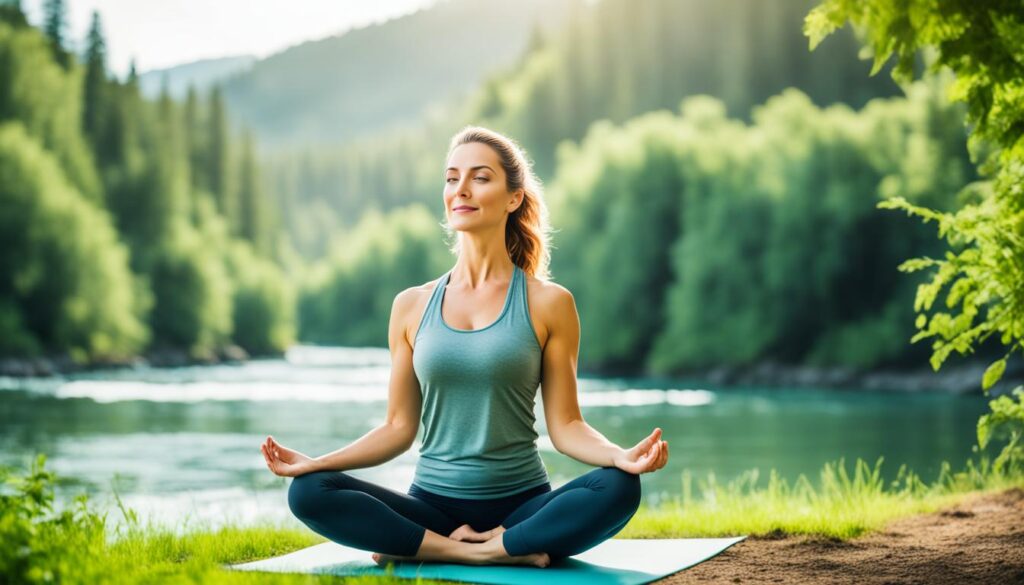Dealing with anxiety can feel overwhelming, but finding the right wellness practices can help. These practices offer a holistic way to manage anxiety and improve mental health. By using various evidence-based methods, people can create strategies to handle their anxiety better.
This guide will show how mindfulness, healthy living, and stress relief can help you control your anxiety. It will also explain the science behind anxiety, covering symptoms, triggers, and risk factors. This knowledge will help readers understand what they’re facing.
This article aims to give readers a toolkit of effective wellness practices. It covers mindfulness, breathwork, exercise, nutrition, and the importance of social support. By following these steps, readers can manage their anxiety and live a happier, more resilient life.
Understanding Anxiety: Symptoms and Causes
Anxiety is a complex condition that shows in many ways, both physical and emotional. Knowing the common symptoms and causes is key to managing it. Symptoms include a racing heart and sweaty palms, along with feelings of dread and unease. These signs can really affect someone’s daily life.
Recognizing Physical and Emotional Signs
Anxiety brings on physical signs like muscle tension and headaches. It also causes emotional signs like too much worrying and trouble focusing. By noticing these symptoms, people can start to figure out what’s causing their anxiety.
Exploring Common Triggers and Risk Factors
Many things can trigger anxiety, from job loss to relationship problems. Some medical conditions, genes, and past traumas can also make someone more likely to have anxiety. Knowing what triggers anxiety can help people manage it better and find ways to cope.
Looking into anxiety helps people understand their own experiences better. It’s the first step towards feeling emotionally better.
The Power of Mindfulness and Breathwork
Dealing with anxiety can feel overwhelming, but there’s hope. Mindfulness practices and breathwork can change everything. They help calm the mind, control emotions, and bring peace within.
Practicing Mindful Meditation Techniques
Mindful meditation is great for handling anxiety. It focuses on the now and our breath. This way, we can watch our thoughts and feelings without getting caught up in them. Regularly practicing can lessen anxiety, boost focus, and make us more emotionally strong.
Breathwork goes hand in hand with mindfulness. Doing specific breathing exercises, like deep belly breaths or box breathing, starts the body’s calming response. It slows down the heart and lowers blood pressure, helping to ease anxiety.
Adding mindfulness and breathwork to your daily life helps you handle anxiety better. These practices help you stay calm and focused. They make you more emotionally resilient, which is key to managing anxiety and feeling better overall.
Embracing a Healthy Lifestyle
Living a balanced, healthy life is key to managing anxiety. Regular exercise and eating well can help you manage anxiety better. Let’s see how these choices can improve your well-being.
Incorporating Exercise and Physical Activity
Exercise is great for reducing anxiety. It releases endorphins, making you feel good and less worried. You can try walking, yoga, or intense workouts to relieve stress and anxiety.
Nourishing Your Body with a Balanced Diet
What you eat affects your mental and physical health. Eating foods full of nutrients helps manage anxiety. Include fruits, veggies, whole grains, lean meats, and healthy fats in your meals.
By exercising and eating well, you can fight anxiety from the inside out. These actions boost your mental and physical health. They help you handle anxiety better and feel more calm and strong.

Wellness: A Holistic Approach to Anxiety Management
Dealing with anxiety needs a full, holistic wellness plan. This plan combines different wellness practices for a lasting way to handle anxiety. It looks at the mind, body, and spirit together. This helps people tackle the deep causes of their anxiety relief and find peace.
Mindfulness is key in this wellness plan. It helps people notice their thoughts, feelings, and body signals better. When mixed with stress-reducing techniques, it gives a strong way to deal with anxiety.
Living a healthy life also helps a lot. This means regular exercise, eating well, and getting enough sleep. These habits boost well-being and help manage anxiety. They make a solid base for lasting anxiety relief.
The holistic wellness way to fight anxiety sees healing as a mix of different wellness methods. By using this integrated approach, people can fully use their mind-body-spirit connection. This makes it easier to handle anxiety’s challenges.
Building a Strong Support System
Dealing with anxiety can be tough, but you don’t have to go through it alone. Talking to family or close friends can give you a lot of emotional and social support. Sharing your feelings with people you trust can make things easier and help you feel part of a community.
Joining support groups is another great way to meet people who get what you’re going through. These groups are safe places to share stories and get empathy. You can also learn new ways to cope from others who have been in your shoes. Being part of a supportive community can really change your life, showing you’re not alone.
Seeking Professional Help When Needed
Having a strong support system is key, but sometimes you might need professional help. Talking to therapists or counselors can give you personalized advice and treatments for anxiety. They can offer new insights, help you find healthy ways to cope, and support you in managing your mental health.
Looking into mental health resources is an important step towards feeling better. You can find these through your doctor, online, or local groups. Remember, getting professional help is a sign of strength and caring for yourself.
The Role of Sleep and Relaxation
Getting good sleep and using relaxation techniques are key to handling anxiety. Poor sleep can make anxiety worse, but restful sleep helps with mental health and strength. By focusing on sleep and relaxation, people can ease anxiety’s tough effects.
Progressive muscle relaxation is a strong way to relax. It means tensing and then relaxing different muscle groups. This helps the body feel calm and peaceful. Yoga and guided imagery are great too. They help you stay in the moment and find peace inside.
Adding these relaxation methods to your daily life can greatly improve sleep and help with anxiety. Taking time to relax and recharge helps you deal with anxiety better. This can make life feel better overall.
Stress-Busting Techniques for Anxiety Relief
Dealing with anxiety can feel overwhelming, but there are effective ways to find relief. Journaling and expressive writing are two powerful tools that can help. They can change how you handle anxiety and improve your emotional health.
Journaling and Expressive Writing
Writing down your thoughts and feelings can be very helpful. It lets you process and reflect on them in a structured way. Journaling helps you understand what triggers your anxiety and what patterns you have.
Expressive writing lets you release emotions, clear your mind, and see things from new angles. It can help you deal with the challenges you’re facing.

Journaling increases self-awareness and mindfulness. It gives you more control over your feelings. Adding this technique to your anxiety management plan can be very beneficial. It goes well with other wellness activities like meditation, exercise, and a healthy lifestyle.
Incorporating Nature and Outdoor Activities
The power of nature in managing anxiety is huge. Being in green spaces like parks or forests can really help. Even your own backyard garden can make a big difference.
The Benefits of Spending Time in Green Spaces
Studies show that nature can calm you down. It lowers stress and helps with anxiety. The sights, sounds, and smells of nature soothe the mind and ease tension.
Outdoor activities like hiking or gardening offer a break from daily stress. They help you disconnect and feel better. Being active and connected with nature boosts your mood and lowers anxiety.
Adding nature therapy and outdoor activities to your routine is a great idea. It’s simple and effective. Whether it’s a walk in a park or a hike in the woods, nature can help ease anxiety.
Cultivating Self-Compassion and Positive Thinking
Dealing with anxiety means finding a balance between understanding our struggles and accepting ourselves. By being kind to ourselves, we can make our mental health journey easier. This change in how we see things can really help us beat negative thoughts and look at life more positively.
Self-compassion is about understanding our experiences without being hard on ourselves. It’s about seeing we’re all in this together and treating ourselves with kindness. When we stop being too hard on ourselves, we become more emotionally strong. This helps us handle anxiety better.
Positive thinking is also key in managing anxiety. By changing negative thoughts into positive ones, we can see our strengths and resources. This helps us face life’s challenges with more confidence and purpose.



